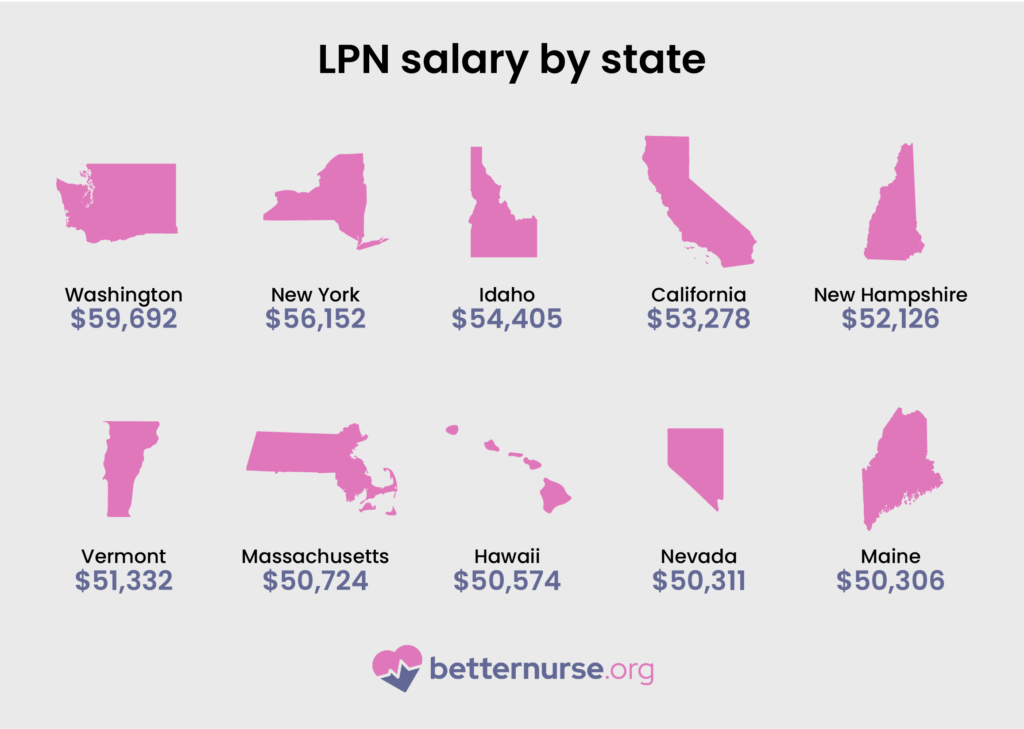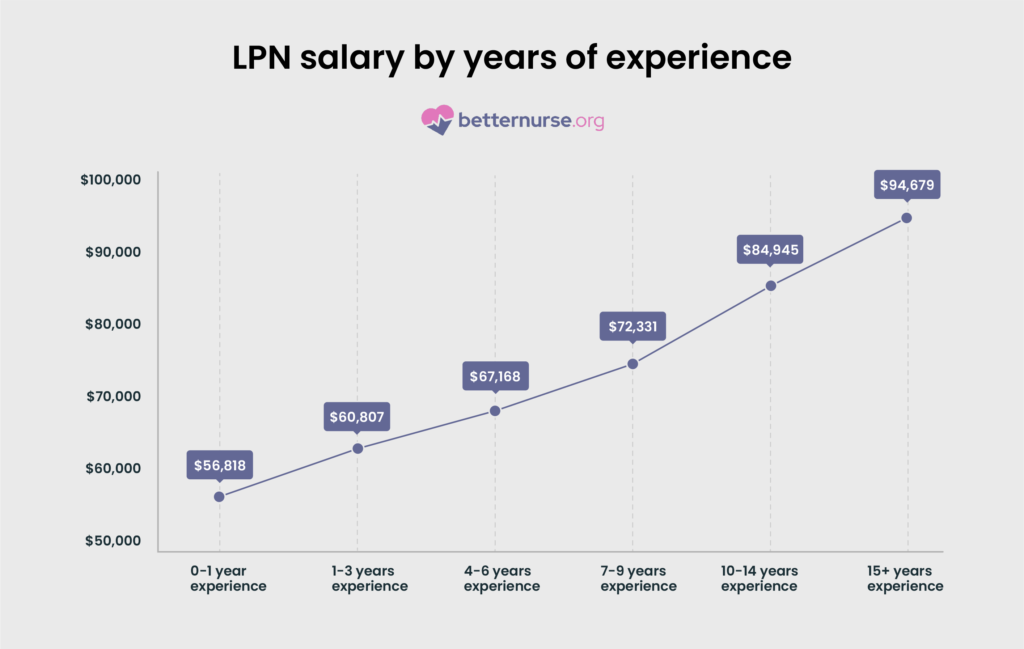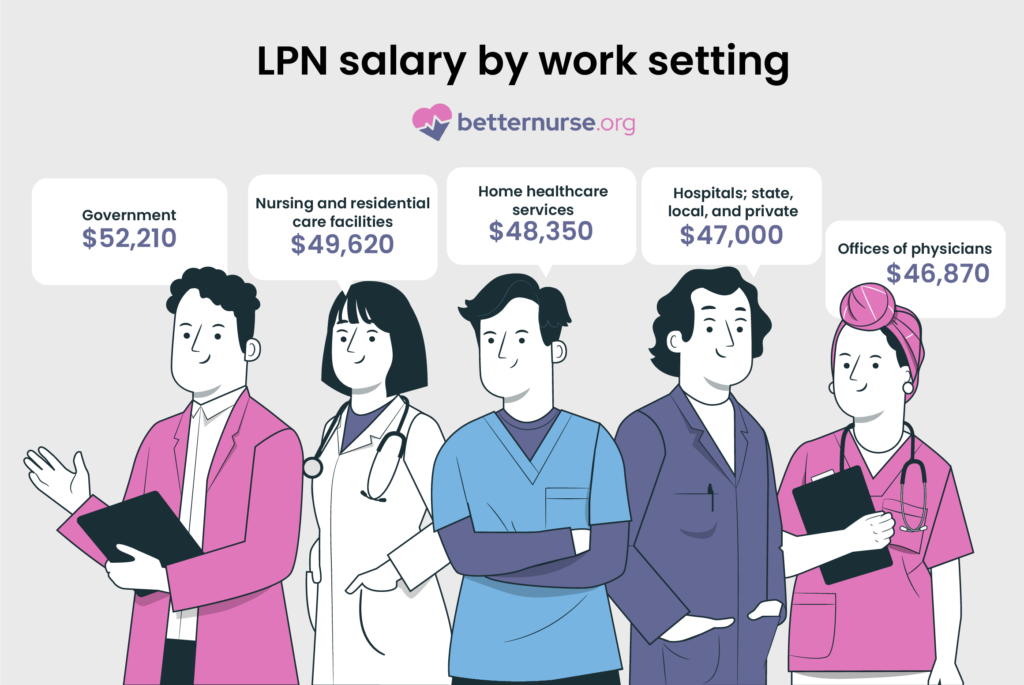Licensed practical nurses (LPNs) play a vital role in providing patient care in various healthcare settings. If you are considering a career as an LPN, one of the critical factors to consider is your potential salary and benefits. Understanding the different factors that can impact LPN salaries is essential for making informed decisions about your career.
This comprehensive guide will explore the factors influencing LPN salaries, such as work setting, geographic location, experience, and education. We will also discuss the benefits of being an LPN and provide insights into potential career growth opportunities. Let’s begin!
Table of contents
What Is an LPN?
An LPN is a healthcare professional who provides basic nursing care under the supervision of registered nurses (RNs) and doctors. Their duties and responsibilities may include taking vital signs, administering medications, dressing wounds, and assisting with basic patient care.
LPNs work in a variety of healthcare settings, including hospitals, nursing homes, clinics, and rehabilitation centers, and they play an essential role in providing patient care and ensuring the smooth functioning of healthcare facilities.
LPN Salary & Job Outlook
LPNs have a promising job outlook with a projected growth rate of 6% from 2021 to 2031, according to the U.S. Bureau of Labor Statistics (BLS). The demand for LPNs is expected to increase due to the aging population and the need for more healthcare professionals.
According to ZipRecruiter, the median annual salary for licensed practical nurses is $51,853. However, LPN salaries can vary depending on location, experience, and industry. For instance, LPNs working in hospitals tend to earn higher wages than those working in nursing homes or clinics. Additionally, LPNs with additional certifications and specializations may earn higher salaries.
Overall, LPNs can enjoy a stable career with competitive wages and opportunities for growth in the healthcare industry.
LPN salary by state
The salary of licensed practical nurses in the U.S. can vary significantly depending on the state where they work. Factors that can affect LPN salaries include the cost of living, the demand for healthcare workers, the level of education and experience required, and the state’s specific laws and regulations governing nursing practice.
Additionally, certain states may offer higher wages to LPNs due to their unique healthcare needs, such as an aging population or a shortage of nursing staff. Below you can see some of the highest-paying states for LPNs in the U.S., according to ZipRecruiter:

LPN salary by years of experience
The experience of an LPN plays a significant role in determining their salary—a more experienced nurse is more valuable to employers.
Here’s an estimation of the average salary of an LPN based on years of experience:

LPN salary by work setting
Licensed practical nurses work in various settings, including hospitals, long-term care facilities, home health care, physicians’ offices, and schools. The average LPN salary varies depending on the work setting, experience level, and location.
Below is a list of the average annual salaries for licensed practical and licensed vocational nurses in the top industries in which they work, according to data by the BLS:

How To Increase Your Salary as an LPN
If you’re an LPN looking to boost your income, there are several strategies you can employ:
- Gain more experience: As you gain experience in the field, you become more valuable to employers. Consider taking on new responsibilities or seeking out opportunities to work with different patient populations or in different healthcare settings. Be sure to highlight your experience on your resume and during salary negotiations.
- Further your education: Continuing education can help you stay up-to-date with industry trends and may make you eligible for higher-paying positions. Consider pursuing additional certifications or degrees in areas such as nursing informatics, healthcare management, or advanced nursing practice.
- Specialize in a specific area: By becoming certified in a specialized area, such as gerontology or IV therapy, you can increase your marketability and potentially command higher pay. Look for certification programs that align with your interests and career goals.
- Network: Attend industry conferences and events to meet other professionals in your field and stay up-to-date on job opportunities and salary trends. Consider joining a professional association for LPNs, which may offer networking opportunities and career resources.
- Consider relocating: If you’re willing to move, consider looking for LPN jobs in areas with higher salaries or in healthcare settings that tend to offer higher pay, such as hospitals or clinics. Be sure to research the cost of living in the area before making a decision.
By using these strategies, you can increase your earning potential as an LPN and advance your career in the healthcare field.
Should You Become an LPN?
The decision to become an LPN ultimately depends on your interests, career goals, and financial situation. Here are some things to consider when deciding if becoming an LPN is the right path for you:
Firstly, LPN programs are usually about one to two years long and require a significant amount of hard work and dedication. You will also need to pass a licensing exam before you can practice as an LPN.
Secondly, LPNs provide basic care to patients, such as taking vital signs and administering medication. It’s important to have strong communication and interpersonal skills and the ability to handle various situations with empathy and professionalism.
Thirdly, while LPNs have a limited scope of practice compared to RNs, there are still opportunities for advancement and specialization. Some LPNs choose to pursue further education and training to become RNs, while others may specialize in a particular area of healthcare.
Ultimately, if you have a passion for healthcare and helping others and are willing to put in the hard work required to become an LPN, it can be a fulfilling and rewarding career choice.
However, if you’re not interested in healthcare or don’t feel that you have the necessary skills or temperament to work with patients, becoming an LPN may not be the best fit.
Benefits of being an LPN
There are several benefits to being an LPN, such as:
- LPNs have a relatively short education and training period compared to other nursing roles, which means they can start their career faster.
- LPNs work in various settings, including hospitals, nursing homes, clinics, and home health care agencies, providing diverse employment opportunities.
- LPNs can gain valuable experience and develop their skills by working in different departments such as pediatrics, geriatrics, and critical care units.
- LPNs are responsible for providing direct patient care, such as administering medication, monitoring vital signs, and assisting with daily living activities, which can be highly rewarding.
- LPNs are in high demand, with the Bureau of Labor Statistics projecting an employment growth rate of 6% over the decade.
- LPNs can advance their education and career by pursuing further education and becoming RNs or pursuing other healthcare-related careers.
What’s the Bottom Line?
A career as a licensed practical nurse is an excellent choice for those passionate about helping others in the healthcare industry. LPN salaries can be influenced by various factors such as education, experience, and location.
However, the benefits of being an LPN go beyond financial compensation. LPNs enjoy job security, the ability to make a positive impact on patients’ lives, and a relatively short training period compared to other healthcare professions.
Want to learn more about different nursing specialties and their salaries? Check out our nursing salary and career guides by clicking here.

Nurse Luke is a CRNA who specializes in Nursing content and still enjoys a very busy career with Locum, Per Diem and Travel nursing in the greater midwest. He has over 25 years of experience in the healthcare field and received his CRNA masters degree from the Mayo Clinic School of Healthcare. He is passionate about helping nurses explore the options of becoming a travel nurse as well as spending time with his Family.



